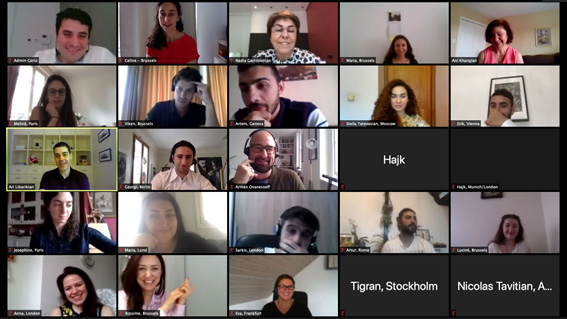
Brussels, 8 July 2020 - Hundreds of participants from 41 different countries attended the AGBU Goriz Live Webinar on July 4 to hear some of the thought leaders in the Armenian world share their experience and expertise on the topic of leadership.
Organised by AGBU Europe as an additional online session of the Goriz 2020 Leadership Development Programme, the webinar gave the opportunity to Armenian young professionals around the world to learn from the experience of three global Armenian leaders: Ari Libarikian (McKinsey & Company), Ani Kharajian (Harvard Business School) and Ruben Vardanyan (Aurora Humanitarian Initiative).
Moderated by Armen Ovanessoff, Principal Director at Accenture, the live webinar focused on the three dimensions of leadership: leading the self, others and organisations.
Senior Director at Harvard Business School Ani Kharajian explained how the way leaders work with their team can make all the difference in achieving their goals, even in challenging and unfamiliar contexts. Leading teams through empathy, humility and open-mindedness, while staying close to one's core values allows leaders to succeed despite possible culture and language barriers. Kharajian also underlined the importance of being very clear about our mistakes: "know when you don't know and be honest because that's when we thrive, when we acknowledge our weaknesses, together we bring our strengths to our best selves".
In his intervention, Armenian-Russian social entrepreneur, impact investor and venture philanthropist Ruben Vardanyan examined how leadership styles have considerably evolved in time and how leadership skills have become more and more critical today, both in the professional world and in our own private spheres. He also noted that measures of success have completely changed over time, adding that "failing is part of the process today", reminding us also that "success comes only when you're fully committed. You have to be ready to lose it all."
Finally, Ari Libarikian, Senior Partner in the New York office of McKinsey & Company and AGBU Central Board member, gave a sharp presentation on how to successfully lead organisations, especially in a time of crisis when even stronger leadership skills are required. He identified three key elements that an organisation must have in order to be successful: a central purpose, a strategy and a culture (set of values). Libarikian developed the notion of "servant leadership" according to which a leader leads by example and advocated the "testing and learning" approach. Furthermore, in times of crisis, Libarikian explained that "we need to favour candour over charisma; in such a context, we need honesty and openness from a leader."
The speakers' presentations were followed by a panel discussion on how to create impact in Armenia. Technology and education came out as two essential and promising fields of investment where the diaspora could engage and make a difference.
The webinar ended with an interactive session answering the question: what would you change or do to be a better leader this year? The words and phrases that appeared one after the other on the screen - listen, resilience, over communication, trust, servant-leader, capture the hearts & minds, be open-minded, be supportive, be passionate, etc. - took the shape of a word cloud on how to achieve our goals as leaders of today and tomorrow. Through its Goriz programme, AGBU Europe precisely aims to contribute to that leadership development journey for all of its participants.
To find out more about the Goriz Leadership Development Programme, you may visit its website at the following link: https://www.leadership.am/
AGBU Europe (www.agbueurope.eu) coordinates and develops the pan-European activities of the Armenian General Benevolent Union. Established in 1906, AGBU (www.agbu.org) is the world's largest non-profit organization devoted to upholding the Armenian heritage through educational, cultural and humanitarian programs. Each year, AGBU is committed to making a difference in the lives of 500,000 people across Armenia, Artsakh and the Armenian diaspora.




